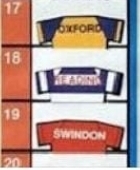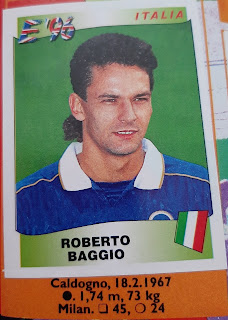N/A: Oxford United, Reading, Swindon Town, Shoot! Magazine Team Tabs, 1996/97
Today Emlyn Jones stretches our brief somewhat to bring us a tale of business intrigue and local rivalry through the medium of one of 1980s and 1990s football’s greatest magazine freebies. While the more attentive of young football fans may have used these to map out the rollercoaster journey of the season I used to stage elaborate draws in order to choose my Championship Manager saves. So thank you team tabs for all the joy I experienced at Field Mill. Over to Emlyn.
A couple of weeks ago, the fantastic 90s Football Memories tweeted a picture of the Shoot! Magazine League Ladders for the 1996/97 season; a Team Tabs wallchart with 112 small card shirts representing each side from the top four tiers of English football alongside the top two Scottish divisions. Slots in the chart allowed speccy little statto kids (like me and, having shared the image with the Sticker's Worth 500 Words WhatsApp group, every other contributor to the blog) to shuffle them around to reflect the latest league table. And collect multiple paper cuts.
Whilst appreciating that this is really stretching the definition of a sticker (though not as much as my post on Robin Friday/The Super Furry Animals), reading through the lists my eye was caught by the lower half of Nationwide Division 1 (the second tier at the time). Huddled together between 17-19th spots were the constituents of the rivalry known as The Didcot Triangle; Oxford United, Reading, and Swindon Town.
As a Reading fan, this was a pleasant throwback. In recent years, fixtures against these two local rivals have been much missed. Alongside our other local rivals, Aldershot, both Oxford and Swindon have inhabited the lower leagues whilst Reading have (just about) maintained status in the Championship, with occasional Premier League forays. For much of their history, however, Reading were much more at home in the lower reaches of the league ladders, and this was the case in 1982, when both Reading and Oxford were gearing up for a season in the third tier of the league.
Both sides were in financial difficulties, with former MP and media mogul Robert Maxwell in full ownership of Oxford, while also holding 19% of the shares in Reading. About a month before the end of the season, Maxwell announced to the BBC that he was close to attaining a holding interest in Reading, and would then merge the two sides. Asserting that both clubs were unable to continue in their current form owing to financial difficulties, he proposed the formation of the Thames Valley Royals; to play initially between Oxford and Reading's home grounds, then in a new stadium in Didcot. On 16th April, the plans were unveiled to the public by David Coleman on Grandstand.
The immediate response from fans of both sides was fury. The rivalry between the two sides was the obvious initial sticking point, while the players themselves were nervous that only half of them would realistically be retained in the new side. Oxford manager Jim Smith attempted to assuage his players' concerns, saying that only Kerry Dixon would be brought over from Reading; probably not too unfair given the sides' relative placings at the time, though Lawrie Sanchez and Stuart Beavon certainly would have had something to say about it. Fans of both sides kicked into action, arranging protests against the proposals. A two-hour sit in at Oxford's ground delayed a game against Wigan Athletic by half an hour, and Reading fans marched from the town centre to the Elm Park ground proclaiming their opposition. Despite all this, Maxwell was unrelenting in his view, stating that "nothing short of the end of the Earth will prevent this from going through".
Former player Roger Smee was among the opponents to the plan, and having built a successful construction company following his playing days, used his business knowledge to look into the ownership of the club. It transpired that a number of shares noted as forming Maxwell's controlling interest had previously been unissued, and so Smee went to board member Roy Tranter, who himself was in opposition to the merger. A legal challenge was taken to the high court contesting the sale of the unissued shares, and just prior to Maxwell announcing the merger on 22nd April 1983, he was handed a high court injunction blocking the sale of the stock. With the suspension lasting until 13th June, Smee put together a bid of his own to purchase the (by now relegated) Reading.
Eventually, Smee was able to win over the board, with a narrow majority backing his bid at an extraordinary meeting of shareholders in July 1983 – and thus ended the chances of the merger. Maxwell retained his ownership of Oxford, seeing them play in the first tier in 1985/86, and later owned Derby County. He also tried to buy Watford from Elton John, and owned various media and technology enterprises. In 1984, he acquired the Mirror Group. It later transpired that he had 'borrowed' millions of pounds from the pension schemes of his other interests to keep the Mirror viable. He would eventually die in mysterious circumstances in 1991, being fished naked out of the sea having fallen off his yacht off the shore of the Canary Islands. By fraudulently saving his interest in the ailing newspaper, it could be argued that he set in motion the chain of events that led to the regrettable continued profile of Piers Morgan.
In contrast, Smee's ownership of Reading would see them win promotion twice in three seasons, and most notably of all, win the Simod Cup at Wembley. Eventually, control of the club would pass to local businessman John Madejski. There are few people who really embody the town of Reading as much as Madejski, with academies, stands at the ground, and lecture theatres bearing his name. He perhaps summed up the bizarre nature of the whole event, quipping when he took ownership "When Robert Maxwell was alive I offered him five pounds a share. When he fell off his boat I got them for 10p. Funny old life isn't it?"





Comments
Post a Comment